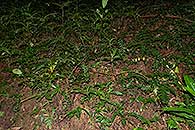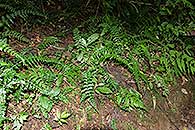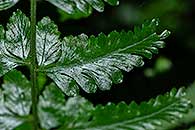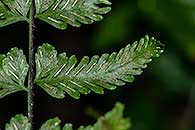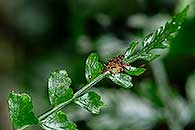Asplenium uschiae Eb. Fisher & Lobin
Synonyms |
|
|---|---|
Common name |
|
Description |
Rhizomes erect, covered with scales; rhizome scales ovate-lanceolate in outline, apex elongate, margins entire, 3.2–5.46 × 0.92–1.57 mm, widest in lower third, the cells in the center becoming darker to the middle and have thicker walls, maroon-colored. Fronds monomorphic, spaced. Stipes (14–)26–32(–35.7) cm, furrowed, greenish when young, becoming pale brown with age, sparsely covered with scales, scales in the lower part similar to those from the rhizome, towards the rachis lanceolate, 2.73 × 0.53–0.7 mm, at their base with maroon-colored appendages, 0.27–0.76 × 0.04–0.06 mm. Lamina 1-pinnate, 1-pinnatifid, lanceolate in outline, (31–)35–62 × 10.4–14.5 cm, with (1–)19–22 pairs of pinnae; pinnae opposite to subopposite, alternate towards the apex, lanceolate in outline, 6.1–8.2(–10) × (1.8)2.1– 3.1(–3.9) cm, the lowermost slightly smaller, tapering towards the apex, proliferous at the base of terminal pinna. Pinnae with the basic acroscopic pinnule ovate, enlarged, totally separated from the secondary rachis, towards the apex pinnules incised from 30–60%, (1.2–)1.4–2.2(–2.5) × 0.6–1.3 mm. Rhachis pale brown, greenish towards apex, sparsely covered with scales; scales lanceolate, 1.74–1.89 × 0.26–0.34 mm, at the base with appendages 0.27–0.76 × 0.04–0.06 mm, cells elongate, rather uniform. Sori (6–)8–11(–12) per pinnae, linear, located on acroscopic vein of pinnae lobes, 4.5 × 0.33 mm; indusia linear, 5.2–5.75(–7.02) × 0.35–0.75 mm, transparent. |
Notes | Asplenium uschiae differs from other species in the dissection of the lamina. A. uschiae has a 1-pinnate-pinnatisect lamina, the largest pinnae mostly incised 2/3 towards the costa with the basal acroscopic segment being an enlarged free ovate lobe, segment margins entire to coarsely crenate. The lamina in A. christii is 1-pinnate with entire pinnae with margin serrate to sharply crenate and the pinnules never separated from the costa. Asplenium bugoiense, A. preussii and A. udzungwense differ in higher dissection of the laminae (lamina 2-pinnatifid to 3-pinnatifid). |
Derivation | |
Habitat | Forest floor in dense montane forests, elev. 1889–2040 m in Rwanda and D.R.Congo. |
Distribution worldwide | See African distribution. |
Distribution in Africa |
|
Growth form |
Terrestrial. |
Literature |
|
